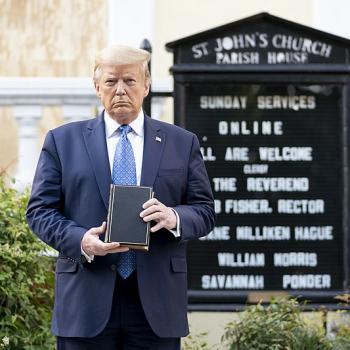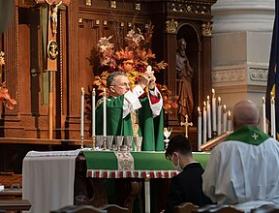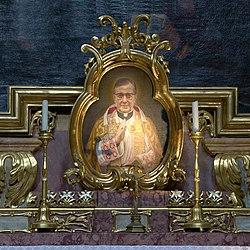It’s a bitter pill for Catholics, watching the videos of Archbishop Carlson’s testimony.
I understand and share the emotions it raises.
But we do not serve ourselves or our Church by pretending that it ain’t so. We’ve got to face this because it is reality. It doesn’t change in any way the simple fact that Jesus said “You are Peter and on this rock I will build my Church and the gates of hell shall not prevail against it.”
What it changes is the blind notion that many Catholics have — that we all want to have — that our religious leaders are sinless Christ figures themselves.
They’re just people, just like us. They are conduits of the graces of the sacraments. God can and does reach through them and into us when we go to them for support and help in our troubles.
But the miracle in that is all on God, not on them. They don’t create the miracle, they don’t control the grace. I know from personal experience that God can reach out and touch anyone, anytime. I believe that all that’s needed on our parts is a willing heart. All we have to do to receive God’s healing grace is say yes to it.
Why, then, a priesthood? If God can reach directly into us Himself then why do we need priests who are conduits of grace?
Because the priesthood is God’s instrument for bestowing this grace in an understandable, predictable and accessible way. I think that the emotionalism that is sometimes exhibited in some churches is an attempt to re-create that first transforming moment of grace when they originally said yes. It is an attempt to touch God and feel it again by using our own emotions to elevate ourselves to that level.

The Eucharist gives us that healing moment of grace, that experience of touching God, of feeling Christ, without any effort on our part. All we have to do is say yes and partake. It is the same with confession. Confession bestows healing grace. So much so that there have been times, including long periods when I was feeling especially challenged, that I went to confession every week, even though my sins were not so grave, because I needed that encounter with Christ, that healing grace that confession gives.
Sacramental confession strengthens us in an almost unfelt way. The more often we go to confession, the stronger we are in resisting evil. In fact, my experience has been that if I confess something on a regular basis, I stop wanting to do it. It takes a bit of time, but that’s what happens.
These graces, as well as the graces of the other sacraments, flow through the priest in a way that is simple for those of us who receive it. We don’t have to understand theology. We don’t have to work ourselves into an emotional high. All we have to do is say yes and accept the grace that is freely given to us.
The crowning moment of grace is always the Eucharist, which is direct contact with Christ. So far as I’m concerned — and I’m not a theologian, so this applies only to me and my understanding — the Church is the Eucharist. And we are the eucharist. Because the Eucharist is Christ. The priesthood exists to bestow grace. Priests are conduits of grace, and it does not matter what kind of hooligan they are personally, the graces of the sacraments flow through them to us, regardless.
Which brings me back to Archbishop Carlson. I wouldn’t call him a hooligan. In fact, I’m not sure how to label him. I don’t want to label him and his faults. It is enough for me that this is the situation in which we find ourselves, him and us. Because at this point, that’s what it’s about: Him and us.
Not, Jesus and us, or even the Church and us. But poor, messed up Archbishop Carlson and us. We don’t have to decide what to do about Archbishop Carlson. What we are tasked with is determining how we are going to relate to our dear Church in the light of the obvious fact that our leaders are ordinary people.
They can be cowards. Just like us.
They can be craven. Just like us.
They can lie, cheat, steal and run away when they get in trouble. Just like us.
They can gossip and betray confidences, hold grudges and be spiteful. Just like us.
They are not Christ.
What they are is men who have consented to be the conduits of grace to Christ’s Church, which is us. There is a moment when heaven comes to earth and the Eucharist becomes His Body, His blood, in which the divine flows through them.
The fact that a few of them become callous about this and begin to devalue it and even start thinking that it is all about them and not Jesus, does not change the impact it has on us. The Eucharist is still real, even if the priest is a messed-up welter of confusion and sin.
Archbishop Carlson reveals himself to be a lawyered-up citizen who ducks and covers under oath in an act of self defense. I have no idea why he didn’t do the obvious thing and exercise his right to take the Fifth Amendment. It would have been far less damaging to his credibility than this performance.
You can find the full text of his deposition here. Many of the salient comments are highlighted to make them easy to find.

There really isn’t any point in trying to find an “out” for Archbishop Carlson in this. The deposition speaks for itself. Besides, it’s not our job to judge Archbishop Carlson. Our job is the much tougher one of working out how to be a faithful Catholic in a world of fallen leaders, including our leaders in the Church.
How do we follow these men when they are so nothing special as this deposition reveals them to be? Not, mind you, worse than us. Most of us would duck and cover in a deposition like this one, just like the Archbishop. Any of us who have brains would get the best legal counsel we could and do exactly what that attorney told us to do.
Archbishop Carlson doesn’t reveal himself to be a fiend in this deposition. He reveals himself to be no better than the rest of us.
Which brings us back to the task that faces us. We are fallen people, served by a priesthood that is composed entirely of fallen people, living in a fallen world.
Yet we serve a risen Savior, Who is God Incarnate. We are called to be “perfect as your Father in Heaven is perfect.”
But we can’t do it. We. Can. Not. Do. It. We don’t get through a single day without at least one and usually many sins of one sort or another.
We want heroes who will give us the illusion of the possibility of human perfection. But human perfection is always just that; an illusion.
To put it bluntly, we are all — priest and parishioner alike — down here in the pits together. As Jesus said, “There is none good except God.”
So how do we solve this conundrum of answering a call to be “perfect” while we are certain that there is “none good” among humankind?
We solve it by getting up every morning and giving our day to Jesus and His Mother. We solve it by availing ourselves of the certain graces of the sacraments. We solve it by forgiving each other and sustaining one another in our weakness.
How does this apply to the Archbishop Carlsons in our clerical leadership? More to the point, how does it apply to us and our response to the Archbishop Carlsons in our leadership?
My answer — and this is just me, talking about me — is that we need to cherish these men and help them as we can. At the same time, we need to stop pretending that they are anything other than fallen human beings. When they stand behind that altar and lift up the host, they are conduits of God’s grace. When they come down from behind the altar and scald us with a fit of rage or lie in a deposition, they are just people, wallowing around in the pit of failed good intentions along with the rest of us.
This is difficult for Catholics. It’s difficult for me. I am still working out how to deal with wounds inflicted by clergy. Some days I don’t do so well with it. Protestants can just dismiss their clergy as fallen people and be done with it. But Catholics are part of a hierarchical Church whose entire governance is built on the administration of these fallen men.
How do we, as Catholics, remain faithful when we see by their actions that we must be judicious about how and when we follow our clergy?
This is a tough one. It’s not always or even mostly about big public dilemmas like Archbishop Carlson’s dipping and dodging deposition. It is usually more personal, and because of that, far more damaging to us as Christians and Catholics.
How do we, say, disregard things a priest or spiritual director says to us in a fit of rage? How do we decide what to believe and what not to believe about the things they say to us? How do we overcome the sense of betrayal when a priest gossips about our deepest hurts? These are more the kinds of things that most Catholics must overcome in their walk of faith. The big public falls from grace seem easy to me compared to those much deeper personal dilemmas. How do we live together as Catholics in this fallen world?
These are hard questions with no easy answers. I’m going to leave it open for discussion and see what the rest of you think. In the meantime, take a look at Archbishop Carlson’s deposition. It’s clearly not a case of dementia or anything like it. He’s dipping and dodging and doing it quite well. Just like us.












